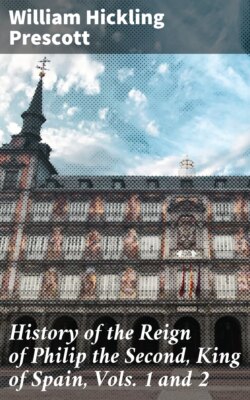Читать книгу History of the Reign of Philip the Second, King of Spain, Vols. 1 and 2 - William Hickling Prescott - Страница 8
На сайте Литреса книга снята с продажи.
ОглавлениеCONDITION OF SPAIN.
From Trent Philip pursued his way, with all expedition, to Genoa, where he embarked, under the flag of the veteran Doria, who had brought him from Spain. He landed at Barcelona, on the twelfth day of July, 1551, and proceeded at once to Valladolid, where he resumed the government of the kingdom. He was fortified by a letter from his father, dated at Augsburg, which contained ample instructions as to the policy he was to pursue, and freely discussed both the foreign and domestic relations of the country. The letter, which is very long, shows that the capacious mind of Charles, however little time he could personally give to the affairs of the monarchy, fully comprehended its internal condition and the extent of its resources.[47]
The following years were years of humiliation to Charles; years marked by the flight from Innsbruck, and the disastrous siege of Metz—when, beaten by the Protestants, foiled by the French, the reverses of the emperor pressed heavily on his proud heart, and did more, probably, than all the homilies of his ghostly teachers, to disgust him with the world and its vanities.
Yet these reverses made little impression on Spain. The sounds of war died away before they reached the foot of the Pyrenees. Spain, it is true, sent forth her sons, from time to time, to serve under the banners of Charles; and it was in that school that was perfected the admirable system of discipline and tactics which, begun by the Great Captain, made the Spanish infantry the most redoubtable in Europe. But the great body of the people felt little interest in the success of these distant enterprises, where success brought them no good. Not that the mind of Spain was inactive, or oppressed with the lethargy which stole over it in a later age. There was, on the contrary, great intellectual activity. She was excluded, by an arbitrary government, from pushing her speculations in the regions of theological or political science. But this, to a considerable extent, was the case with most of the neighboring nations; and she indemnified herself for this exclusion by a more diligent cultivation of elegant literature. The constellation of genius had already begun to show itself above the horizon, which was to shed a glory over the meridian and the close of Philip's reign. The courtly poets in the reign of his father had confessed the influence of Italian models, derived through the recent territorial acquisitions in Italy. But the national taste was again asserting its supremacy; and the fashionable tone of composition was becoming more and more accommodated to the old Castilian standard.
It would be impossible that any departure from a national standard should be long tolerated in Spain, where the language, the manners, the dress, the usages of the country, were much the same as they had been for generations—as they continued to be for generations, long after Cervantes held up the mirror of fiction, to reflect the traits of the national existence more vividly than is permitted to the page of the chronicler. In the rude romances of the fourteenth and the fifteenth century, the Castilian of the sixteenth might see his way of life depicted with tolerable accuracy. The amorous cavalier still thrummed his guitar, by moonlight, under the balcony of his mistress, or wore her favors at the Moorish tilt of reeds. The common people still sung their lively seguidillas, or crowded to the fiestas de toros—the cruel bull-fights—or to the more cruel autos da fé. This last spectacle, of comparatively recent origin—in the time of Ferdinand and Isabella—was the legitimate consequence of the long wars with the Moslems, which made the Spaniard intolerant of religious infidelity. Atrocious as it seems in a more humane and enlightened age, it was regarded by the ancient Spaniard as a sacrifice grateful to Heaven, at which he was to rekindle the dormant embers of his own religious sensibilities.
The cessation of the long Moorish wars by the fall of Granada, made the most important change in the condition of the Spaniards. They, however, found a vent for their chivalrous fanaticism, in a crusade against the heathen of the New World. Those who returned from their wanderings brought back to Spain little of foreign usages and manners; for the Spaniard was the only civilized man whom they found in the wilds of America.
Thus passed the domestic life of the Spaniard, in the same unvaried circle of habits, opinions, and prejudices, to the exclusion, and probably contempt of everything foreign. Not that these habits did not differ in the different provinces, where their distinctive peculiarities were handed down, with traditional precision, from father to son. But, beneath these, there was one common basis of the national character. Never was there a people, probably, with the exception of the Jews, distinguished by so intense a nationality. It was among such a people, and under such influences, that Philip was born and educated. His temperament and his constitution of mind peculiarly fitted him for the reception of these influences; and the Spaniards, as he grew in years, beheld, with pride and satisfaction, in their future sovereign, the most perfect type of the national character.
